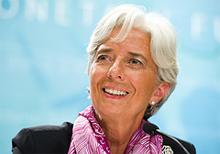
Typical street scene in Santa Ana, El Salvador. (Photo: iStock)
IMF Survey : Lagarde Sets Out Global Policy Actions to Stay Ahead of Crisis
April 10, 2013
- Financial conditions improving, but not yet translating into enough growth, jobs
- Three-speed global economy emerging
- All must act together to stay ahead of crisis
In a speech at the Economic Club of New York on April 10, IMF Managing Director Christine Lagarde called upon global policymakers to act to get ahead—and stay ahead—of the crisis.

Lagarde: ‘Job creation is an urgent priority. Without this, we risk a wilderness of wasted potential and ruined ambition’ (IMF file photo)
IMF-WORLD BANK SPRING MEETINGS
“In far too many countries, improvements in financial markets have not translated into improvements in the real economy—and in the lives of people,” she noted. Lagarde was speaking ahead of the IMF-World Bank Spring Meetings that take place April 19-21 in Washington, involving economic policymakers from the IMF’s 188 member countries.
Lagarde observed that while the global economy had shown signs of strengthening since six months ago “yet, global growth is not expected to be much higher this year than last,” she said. “We are seeing new risks as well as old risks.”
The IMF Managing Director noted that we are seeing the emergence of a “three-speed” global economy—those countries that are doing well (mainly the emerging markets and developing countries), those that are on the mend (including the United States), and those that still have some distance to travel (such as the Euro Area and Japan).
Three-speed global economy
All three groups need action to stay ahead of the crisis:
• The emerging markets and developing economies are worrying about the potential fallout from exceptionally loose monetary policy in advanced economies. These countries need to boost their defenses including by rebuilding fiscal policy space and stepping up banking sector regulation and supervision.
At the same time, advanced economies also bear some responsibility in terms of delivering a better fiscal policy and more financial repair.
• While the fiscal cliff had been avoided, the United States needs a more balanced fiscal policy, which is now too aggressive in the short term and too timid in the medium term. At this point in the recovery, it is more important than ever to put in place a credible medium-term roadmap to bring down the debt.
• While euro area policymakers have taken a number of significant steps, the priority in that region is to clean up the banking system by recapitalizing, restructuring, or—where necessary—shutting down banks. This includes making progress with banking union.
Japan’s recently-announced framework of ambitious monetary easing is a positive step—and needs to be complemented with actions to lower the public debt and structural reforms to shift the economy into higher gear.
Working together to stay ahead of the crisis
Lagarde noted that there is another set of overarching issues that affects all regions—issues that have been with us since the beginning of the crisis but have not yet been fully resolved.
The first of these is financial sector reform. “We simply cannot have pre-crisis banking in a post-crisis world,” Lagarde said. She called for more progress on the regulation of too-big-to-fail, derivatives, and shadow banking.
The second overarching issue is more balanced global demand: there is a need for more action from surplus countries, including by strengthening investment in Germany and strengthening consumption in China.
The third point is more emphasis on growth, jobs, and equity. The best way to create jobs is through growth, but policymakers can also deploy labor market policies to spur job creation more directly. “Job creation is an urgent priority,” Lagarde said, “without this, we risk a wilderness of wasted potential and ruined ambition—especially for a generation of young people.”


